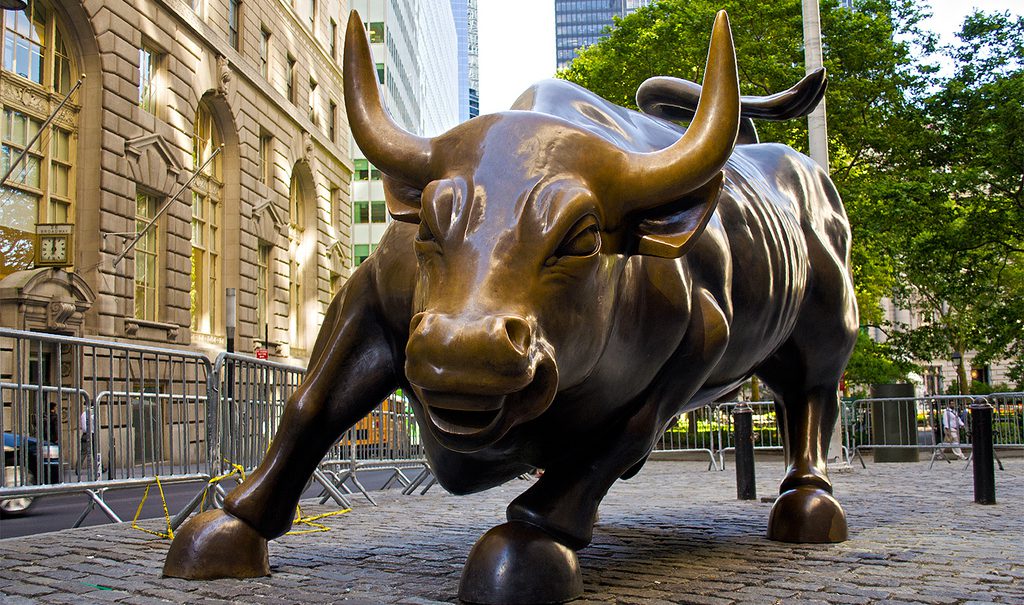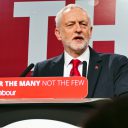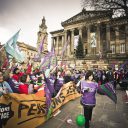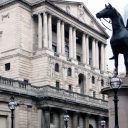Make debt slaves into money masters

The Wall Street Bull. Photo: htmvalerio. Flickr. Some rights reserved.
The way banking works today, where money is mostly (i.e. 97%) debt-money, makes indentured slaves of us all. The more the main banks can extend new credit in exchange for our promises to repay, the more interest they can rake in, but the harder we have to work to service that debt. Rising house prices mean the more money the banks can create, out of nothing, and the more enslaved the populace becomes as it labours to pay the bank’s mortgage, or the landlord’s rent, or mortgage (obtained from the bank), or face eviction. We are shackled by this system. But it does not have to be this way. Money is a social construct. We can change money and change the world.
If we re-base the system on sovereign money not debt-money, the growing inequality within society between the rentiers and those who work for a living, the increasing vulnerability of the real economy to financial boom and busts, and channelling of investment away from real wealth production into financial trivia, will all ameliorate. The vast bulk of society will be better off, and the banking elite will be cut down to size. The way to achieve this is to change the way money is created.
Most money circulating in the economy is not in the form of notes and coins, it is digital information held in, or transferred between, the accounts that firms and individuals hold at banks. This digital money is simply created by these banks out of nothing – double entry bookkeeping to be more exact – when they grant you credit. And then they charge you interest on it. If you believe a loan was only made possible by someone else’s deposit you are just labouring under an illusion. It’s a common illusion, it’s a highly plausible one, but it’s an illusion just the same. Consider; it is a reasonable assumption that if a firm offers to rent you a car, or if a neighbour offers to lend you his lawnmower, they have the car or lawnmower in question. This lends intuitive credence to the picture of money lent by one person = money deposited by another. But it is wrongheaded to think this way. And the banks aren’t going to disillusion you. But the fact is that almost all money comes into existence when banks open lines of credit. It’s nearly all based on debt.
When you spend this digital money the banks, in effect, have created their own money by substituting their name on the cheque or bank transfer, or other financial instrument, for your name. The up-proven trustworthiness of your own promises to honour the many transactions of daily commerce are replaced by the solid reputation and proven reliability of promises from Barclays or HSBC. The only thing that holds the banks back from flooding the economy with this digital money is the fact that, in swapping their own credibility for your promise to repay, they can run out of creditworthy borrowers; reliable debt slaves. If, having spent the digital credit provided by the bank, you then default on repayment to the bank, it is genuinely out of pocket. Furthermore, this notion of individual “creditworthiness” is highly subjective and influenced by confidence in the economy in general. Credit can be abundant or as rare as hen’s teeth. Of course, under this system not only do the banks create money out of nothing and then rent it back to you; when you duly repay the line of credit the money just disappears ! Under this system of money creation the quantity of money circulating in the economy is determined by the sentiments of bankers as they trade-off between greed and risk-aversion. The total money in the economy shrinks if the rate of debt repayments is greater than the rate of money creation. Yes, this system, the one we have now, also destroys money. But a sound money system would not be subject to such vagaries.
So, the total quantity of money circulating in the economy is currently set by the confidence of the banks. If they think times are good they will relax credit criteria, and they will especially like it if business confidence is strong, if employment is growing, spending is high and asset prices are booming. Particularly house prices: bankers love rising house prices as security for their loans. When they loose that confidence, the money circulating in the economy shrinks as loans are repaid (or default) and are not replaced with equivalent new loans since credit criteria are tightened. This was the root of the 2007-8 global banking crisis as the values of the largely USA sub-prime housing market collapsed. Once assets that loans are secured against start to fall in price, the urge is to offload those assets and prices collapse even further. And Governments, that’s you and I, the taxpayers, have to step in to stop the whole system from collapse. Individual banks were rescued or allowed to collapse, but the larger problem of lost confidence, imploding money supply, are less easily addressed. Hence Quantitative Easing (QE) across the world. QE is where the central banks (e.g. Bank of Japan, Federal Reserve, European Central Bank or Bank of England) steps in to, in effect, boost the supply of money to make up for the shrinkage in aggregate money caused by the private banks. The central banks create new digital money to fill the gap left by retreating private money.
It should be noted that the current system of Quantitative Easing works in such a way as to boost the reserves of banks and other financial institutions such that the value of existing assets is inflated. In fact the Bank of England’s own estimates of the earlier round of QE, some £375bn in 2009-11, is that it increased the wealth of the top 5% of all households by about £128,000 apiece, whilst doing almost nothing for the poorest 50% of households. But, if the objective is simply to keep the economy from deflation, it would be just as possible and certainly more reflationary of economic activity (rather than share prices and property values) to give the newly created central bank digital money to households to spend into the real economy, or to use it to finance public projects – house-building or infrastructure or alternative energy – i.e. real assets.
So the present monetary system, based upon credit allocation by private banks, is unstable and unfair and is building a UK economy overweight with debt and house prices beyond sanity. It reduces the bulk of the population to debt slavery, whilst privileging the very few. If we wish to change track we must change the way in which money is created.
The intention of the 1844 Bank Act was to prevent private money creation by confining all cash, both coin and paper, to origination by the Bank of England. Money would be sovereign and the seignorage (profit made between the cost of producing the coins or paper money and their face value) would accrue to the State. Times have moved on; cheques, credit and debit cards and more sophisticated debt instruments have burgeoned and, helped by computerisation and de-regulation, the role of private debt based digital money now vastly outweighs cash. Yet most people, including a good number of MPs, are still stuck with the belief that only the State creates money. To get out of the current dysfunctional system we must restore the intentions of that 1844 Act and create a new Act, fit for the 21st Century which covers coin, paper and digital money. Make the people the masters of a new debt-free Sovereign money. Change money and change the world.






